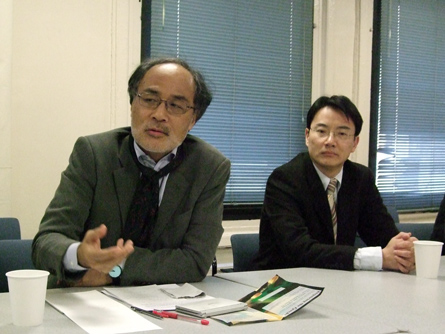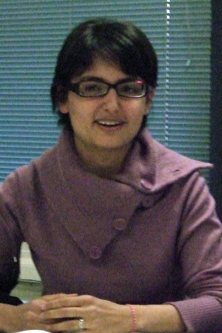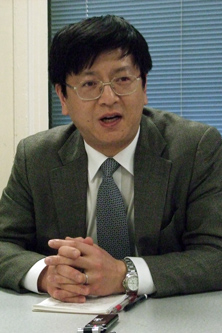【報告】 Workshop on "The Epoch", NYU, March 25th
The workshop started with Yasuo Kobayashi' opening remarks on the problematic of "the epoch".

Following his introduction to Viren Murthy's seminar of the previous day, he linked the necessity for a new type of thinking in order to face the new reality of the age of networks. Referring to Negri's concept of the multitude and the Empire, Kobayashi diagnosed the age with a state of "general neuroses" and introduced the question of "how to describe the time that we live in", one of the indications of which may be found in Haruki Murakami’s literature. Kobayashi approached this question through the idea of "topography", thus defining our being as a landscape configuration. In this vein he redefined the necessity for a new way of thinking as a "topographical survey" or "a renewal of the mapping of our being". Description of these landscapes is profoundly connected to the new philosophical activity that operates in a vertical direction, reified in the image of the "hole" (or Murakami's well) and reaching out at a "polar star" pointing towards an outside beyond our human values and meaning. Transcending Murakami's metaphor of the person at the bottom of the well, Kobayashi described our being as never isolated, "ours" by definition, "being together" and already coexisting through the landscape.


Kobayashi's talk was followed by two brief presentations by Dennitza Gabrakova and Wang Qian from UTCP. Gabrakova's presentation was concentrated on the possibilities for creation of new image-concepts by introducing her work on the conceptualization of Lu Xun's "yecao" (wild grass, weeds) in order to cover Japan's modernization. Wang called for reevaluation of the relevance of Maruyama Masao's discussion on modernity, revealing the latter's apt understanding of western modernity, on the one hand, and of Maruyama's view about the crisis in the humanities brought by extreme specialization, on the other.
Takahiro Nakajima made valuable comments on these presentations, referring to Tosaka Jun's thought of drawing a tangent to the epoch and the idea of morality. The emphasis on spatiality in the approaches of the presenters to the issue of time, noted also by Thomas Looser, was associated in the end to W. Benjamin's idea of the dream. One of Kobayashi's concluding remarks was that awakening might be attained only by force of dreaming. To Mitsuhiro Yoshimoto's asking for precision of the crisis in the humanities, Kobayashi replied by pointed out the lack of a broader concern for the "human" to counterbalance the discourse of brain sciences.
(Dennitza Gabrakova)






